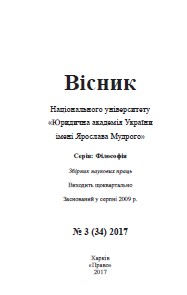ВІРТУАЛЬНА ПРИРОДА ПРАВА КРІЗЬ СЕМАНТИЧНИЙ ВИМІР НАЛЕЖНОГО І МОЖЛИВОГО
THE VIRTUAL NATURE OF LAW IN A SEMANTIC DIMENSION PROPER AND POSSIBLE
Author(s): J. V. MelyakovaSubject(s): Logic, Philosophy of Law, Ontology
Published by: Національний юридичний університет імені Ярослава Мудрого
Keywords: the virtuality of law; semantic logic; deontology of law; modality; discourse of law; simulation space; communication;
Summary/Abstract: The basis of virtual law is the understanding it as a reality of absolute chance. The absolute opportunity, along with the openness, anonymity, creativity and freedom are the essential characteristics of virtual reality. It makes possible the use of the concept of «virtuality» in the field of being law. The virtual nature of the law manifests itself in the semantic space of language best of all. Therefore, a methodological discourse on the topic virtualistic of law is precisely in the field of structural linguistics, hermeneutics, phenomenology and the theory of deconstruction. Already grounded in the philosophy of deontological essence of law is not limited to the understanding of law as of Existence-Shoulds, and is revealed as Existence-Absolute possibility. The reality of law today is virtualized in terms of communication, expression, methodology understanding and representation of meanings. The ontology of the law virtualistic allows the law to take its place in the modern plural reality. The hermeneutic method used in the study not in terms simply of the method of interpretation of the text (W. Dilthey), but in sense of as to understandsng existence (H.‑G. Gadamer) in the framework of the ontological hermeneutics. Brings its own methodological feature in this study and hermeneutics of factuality of M. Heidegger. The «facticity» – a purely phenomenological category – has a distinct temporal character, is a subjective experience of thing. While the epistemology and all logical focus on the universal, objective, timeless, facticity focuses on identification of temporary, casual, spontaneous, particular, individual, single and unique. The facticity is the access to the event, which is not consciously, but experienced. The law deontology of the Existing and Proper built through techniques of the semantic logic of possible worlds. Legal category modalities (obligatory, permitted, prohibited, proper, desirable, necessary, casual) work in semantic logic, detecting the probabilistic nature of legal meaning that is the essential characteristic of the virtual. Exploring the ontology of the virtual, we rely on such categories as: ability, potentiality, energy, activity, actualization, realization. The term «virtuality» in the philosophy of law is used not in the value space of mechanical reproduction. In this case, the «virtuality» is the broad generic term which characterizes a way of the Existing today’s reality, the law in its objective, subjective and symbolic dimensions.
Journal: Вісник НЮУ імені Ярослава Мудрого. Серія: Філософія, філософія права, політологія, соціологія
- Issue Year: 34/2017
- Issue No: 3
- Page Range: 57-64
- Page Count: 8
- Language: Ukrainian

